School students
What is clinical radiology?
Radiology is a continuously evolving specialty involving the use of cutting-edge techniques. Becoming a radiologist puts you at the forefront of a fascinating field where you will work alongside like-minded individuals.
What skills do I need?
- A keen and eager mind
- Passion for problem solving
- Determined
- A team player
What is clinical oncology?
Oncology is a rewarding field of medicine that specialises in the treatment of cancer with drugs, including the commonly known chemotherapy.
What skills do I need?
- A curious mind
- Excellent communication skills
- Resilience
- Good practical skills
Click through the career pathway:
You decide to pursue a career in medicine
Medical school
Min 4-6 years - you complete an undergraduate degree in medicine.
FAQs
See how much you can earn as a clinical radiologist and clinical oncologist.
Before becoming a specialist doctor, you will have to undertake five to six years at medical school, learning about all aspects of medicine. There are approximately 34 medical schools all over the UK, each with their own entry requirements and a slightly different curriculum that incorporates varying elements of all the medical specialties.
Before committing to apply for medical school it is important that you reflect on all the factors involved in your decision-making process:
-
Where do I want to study?
-
How will I finance my degree?
-
What kind of course is most appealing to me?
-
What are the entry requirements?
-
What A levels (or equivalent) do I need to have?
More information about how to apply for medical school and details on the process can be found at the Undergraduate Courses at University and College (UCAS) website and on the Medical Schools Council's dedicated pages.
Each medical school has its own curriculum that contains different options and modules for medical specialties. Therefore, there are some medical schools that will feature certain specialties more than others, and vice versa.
Career development
Our expert advice will guide you through all stages of your career, from choosing the right specialty, to offering support through professional networks.
